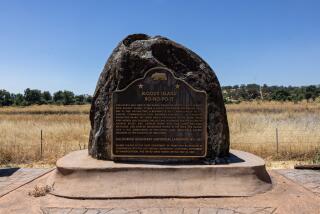The Name Game
- Share via
SAN FRANCISCO — When triumphant rebel leader Laurent Kabila changed the name of his country from Zaire to the Democratic Republic of Congo last week, it was only the latest in a series of names imposed over the centuries on a long-suffering people. Whether a change of life for the better will accompany the change of name remains to be seen.
There is always politics to name changes, and nowhere more so than in a country long swept by conquests and upheavals. Is there any territory on Earth that has been called so many different names? Kongo, the Congo Free State and the Belgian Congo, Zaire and the Democratic Republic of Congo--the various names given to this land have seldom, if ever, been chosen by its inhabitants, and say far more about the ambitions of their rulers than the identity of the state.
One reason for the territory’s new name is an attempt to summon up a past era of glory. In 1482, when a Portuguese explorer and his crew became the first Europeans to step ashore in this part of the world, they found a large, thriving kingdom of several million people, stretching over some 300 miles square. It was known as the Kingdom of Kongo, with its hilltop capital at the town of Mbanza Kongo.
The kingdom was ruled by the “ManiKongo,” a king chosen by an assembly of clan leaders. To symbolize his royal authority, he wore a small leopard-skin cap and carried a zebra-tail whip. He commanded a sizable army and sat on a throne made of wood inlaid with ivory.
The towering figure in early Kongo history was a ManiKongo who took the throne in 1506, after converting to Christianity, learning to read and write Portuguese and taking on the name Affonso. Affonso had a tragic awareness of a new force that had begun decimating his kingdom: the Atlantic slave trade. In 1526, he wrote King Joao III of Portugal:
“Many of our subjects eagerly lust after Portuguese merchandise, that your subjects have brought into our domains. To satisfy this inordinate appetite, they seize many of our black free subjects . . . even nobles and their sons . . . . They sell them . . . after having taken these prisoners [to the coast] secretly or at night, so as not to be seen. As soon as the captives are in the hands of white men they are branded with a red-hot iron.”
His opposition to the overseas slave trade made Affonso hated by the small group of Portuguese merchants and priests living in his capital. Several tried to assassinate him as he was attending Mass on Easter Sunday in 1540. Affonso escaped, but many indigenous leaders in later years who displeased the Europeans would not be so lucky.
The Portuguese could buy all the slaves they wanted at the coast, so they never ventured far inland. The first European to cross the entire territory today known as Congo was the explorer Henry Morton Stanley, in 1874-77.
Stanley’s feat caught the eye of an aspiring empire-builder, King Leopold II of Belgium. Leopold was brilliant, charming and greedy--and immensely frustrated by being the ruler of such a small country. To his further exasperation, it was a country with no interest in empire. No matter. If Belgium didn’t want colonies, he would find his own. He hired Stanley, and for five years Stanley traveled for him up and down the Congo River by steamboat, persuading chiefs, most of whom had little idea of what they were doing, to acknowledge Leopold’s sovereignty. In 1884 and 1885, the United States and all major European nations signed treaties recognizing the territory--with essentially the same borders as today--as Leopold’s.
The name of Leopold’s colony-in-the-making was unusual, for the king didn’t want it to appear as a colony. The great powers were starting to jockey for position in Africa, and Leopold knew his best chance at getting them to recognize his claim was to portray himself as merely a philanthropist trying to bestow civilization and Christianity on the benighted Africans. So the entity was called the International Assn. of the Congo.
Leopold was merely the chairman of this charitable-sounding entity, he said. The International Assn., the king insisted in an article he wrote for the Times of London, was a sort of “Society of the Red Cross; it has been formed with the noble aim of rendering lasting and disinterested services to the cause of progress.”
However, names still offered a clue to whose progress was being served here. In the land controlled by the International Assn., there was a Leopoldville, a Leopold Hill, a Leopold River and a Lake Leopold II--not to mention Stanleyville and Stanley Falls. Once Leopold was safely in control, all pretense of philanthropy evaporated and he changed the name. In mid-1885 was born l’Etat Independant du Congo, or the Congo Free State.
It was neither independent nor free. The Congo was the scene of the worst single blood bath in the European conquest of Africa. Between 1880 and 1920, demographers estimate today, the territory’s population fell by some 10 million.
Some were killed in a prolonged series of uprisings brutally suppressed by Leopold’s private army, the Force Publique. Hundreds of thousands more were worked to death as forced laborers, mainly as gatherers of wild rubber. Millions of others died because they fled this draconian regime and ended up in swamps or jungle where there was no food or shelter. Millions more died of disease.
The chance to get rich quick on the rubber and ivory boom attracted white adventurers to the Congo from throughout Europe and the United States. Often they were hard-bitten men who might otherwise have joined the French Foreign Legion or the Yukon gold rush. In the Congo, they could find combat and riches both. A visitor of a different sort was a young, Polish-born steamboat captain named Joseph Conrad. Conrad was horrified by what he saw during the six months he spent there in 1890. Nearly a decade later, he wrote about the brutality of the place in “Heart of Darkness.”
By then, Congo atrocities were front-page news all over the world. In 1908, a huge international protest movement forced an aging King Leopold to turn his personal colony over to Belgium, which, it was hoped, would administer it more fairly. The flag of the Etat Independant du Congo (a gold star on a blue background) came down and the Belgian flag went up. With it came another name change: to the Belgian Congo.
Belgian rule did not end forced labor, but it did bring some improvements, mainly because administrators saw that to keep on in such a murderous way would eventually leave them no labor force. The Belgians, however, were unprepared for the anti-colonial feeling that swept through Africa in the 1950s, and forced them to hastily give their colony its freedom in 1960. On the eve of independence, there were fewer than 30 black university graduates in the territory. There was no Congolese physicians.
The newly independent country became the Republic of the Congo; then changed again, in 1964, to the Democratic Republic of the Congo. But there was little democratic about it. Pre-independence voting in 1960 was the first and last real national election. The coalition government that resulted was headed by Prime Minister Patrice Lumumba, a mercurial, fiery orator who preached the need for Africa to be economically, as well as politically, independent. This was anathema to the U.S. and European corporations, which had major investments in the Congo’s vast reserves of copper, cobalt and diamond mines.
About two months after Lumumba came to power, a U.S. National Security Council subcommittee decreed his assassination, and CIA-backed anti-Lumumba forces did the job. Lumumba, like millions of Congolese before him, ended up in an unmarked grave.
The key figure in the government factions who arranged Lumumba’s murder was Joseph Desire Mobutu. With U.S. encouragement, he staged a coup in 1965, and during the three decades that followed, the United States gave Mobutu well over a billion dollars in civilian and military aid. For its heavy investment, the United States got a regime that was reliably anti-communist, but Mobutu’s reign was one long orgy of looting, punctuated by yet another change of name for the country, in 1971, to Zaire.
Mobutu’s name-changing covered everything: Leopoldville became Kinshasa, Stanleyville became Kisangani and so forth. All men and women had to abandon their Christian names for indige- nous ones. Mobutu became Mobutu Sese Seko Kuku Ngbendu wa za Banga, which, according to an official translation, meant, “the all-powerful warrior who, because of his endurance and inflexible will to win, will go from conquest to conquest leaving fire in his wake.” Government-owned media referred to him variously as the “guide,” the “father of the nation” and the “messiah.”
Mobutu’s name-changing mania was supposed to celebrate his people’s African heritage. Yet, the whole campaign had a French name--authenticite--and the name he chose for his country, its unit of currency and its major river, Zaire, was in fact a Portuguese corruption of the word for river--”nzari,” “nzali,” “nzadi”--in various local languages. In the ways that mattered most, Mobutu didn’t Africanize anything--he Mobutuized it. He saw to it that the country’s wealth flowed mainly to foreign mining companies and into his own Swiss bank accounts, and into financing his string of palatial homes in France, Spain, Portugal, Switzerland, Belgium and elsewhere.
Mobutu’s loyalty to his U.S. backers made him a popular visitor to Washington, where he soon shrewdly abandoned his military uniform for a leopard-skin cap like that once worn by the rulers of the ancient Kingdom of Kongo. Ronald Reagan received Mobutu at the White House several times, praising him as “a voice of good sense and good will.”
Today, Mobutu is ailing and exiled; others must rebuild the ruins he leaves behind. It will not be easy. History lies heavily on Africa, and nowhere more so than on Congo. The centuries of the slave trade, the ruthless plunder under colonialism and three decades of further plundering by Mobutu have left no experience of democracy and a land devastated beyond imagining: of people in rags, of children without schooling, of hospitals without medicine. It will take far more than a change of name to even make a start on setting things right.
More to Read
Sign up for Essential California
The most important California stories and recommendations in your inbox every morning.
You may occasionally receive promotional content from the Los Angeles Times.










